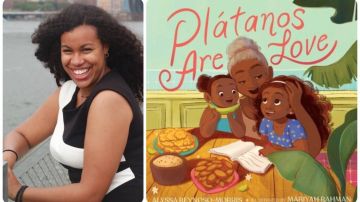Alyssa Reynoso-Morris Talks ‘Plátanos Are Love’ and BIPOC Representation in Publishing
Queer Afro-Latinx and Bronx-native Alyssa Reynoso-Morris is proud of her Dominican and Puerto Rican roots and it’s through her storytelling that she’s celebrating her cultura and community

Photos courtesy of Alyssa Reynoso-Morris
Queer Afro-Latinx and Bronx-native Alyssa Reynoso-Morris is proud of her Dominican and Puerto Rican roots and it’s through her storytelling that she’s celebrating her cultura and community. She recently published Plátanos Are Love, a children’s picture book that centers on a young girl and her abuela and the countless ways which plátanos are more than just a delicious treat but an essential part of Latinx culture, community, and family. The book is inspired by her life in the Bronx, NY, and modeled after her own relationship with her abuela. She hopes readers also see a little bit of themselves in her story and connect with the story of love through food. Throughout the book, readers are reminded of how plátanos are love, from growing in bunches similar to familia to how the recipes were passed down from ancestors in oral traditions.
“When children read Plátanos Are Love, I want them to feel loved. I want them to know their culture and experiences matter and should be sources of pride,” Morris tells HipLatina.
“With every pop of the tostones, mash of the mangú, and sizzle of the maduros, a little girl learns that plátanos are her history, they are her culture, and—most importantly—they are love,” she writes.
Morris, who lives in Philadelphia with her partner and daughter, shares that her child is not only her toughest critic but the reason why she began to take writing seriously due to the lack of representation in children’s books. She shares that only one percent of submitted manuscripts are actually published and of those, only about 30 percent are written by BIPOC authors. She is the change she wants to see in the industry.
Eight percent of people in publishing were Latinx, the least of any of media, yet we make up 18.9 percent of the population who identifies as Latinx, according to a 2021 report by the Government Accountability Office. A 2022 follow-up found that seven percent of writers, authors, and editors are Latinx.
As a self-proclaimed writer at just seven years old, Morris wrote the book, A Good Writer, with the help of her mother. It seems that seven-year-old Morris was confident in her fate as a storyteller as she wrote the line, “Writing is magic… When I write I feel proud of myself.” This confidence has undoubtedly transferred in adulthood as her expected book releases only reaffirm her purpose as a storyteller.
“That book is not traditionally published but I keep it as motivation to keep going because I don’t want to disappoint 7-year-old Alyssa. As far as my inspiration to pursue writing, the credit goes to my grandmother, and authors like Julia Alvarez and Sandra Cisneros inspired me to pursue literature. My abuela – the original storyteller – had a second-grade education, but that didn’t stop her from telling the best stories that captivated.”
Aside from the influence that her upbringing has had on her career as a storyteller, Morris has also carried the values that her grandmother instilled in her from childhood onto the work that she does outside of literature. “As a little girl, my grandmother always taught me the importance of giving back. At a young age, I used to give away my clothes and toys to my family in the Dominican Republic. On Thanksgiving, we always had an open-door policy for those that found themselves without a meal. We shopped and I continue to shop at thrift stores because we were poor but we knew there were others with even less than us. This ideology influenced my career path.”
Morris is an honorary Musa with Las Musas Books, the self-proclaimed first collective of Latinas and otherwise marginalized people whose gender identity aligns with femininity who amplify each other’s work within children’s literature. Although her journey to becoming a storyteller is filled with joy and connection, she wants young writers to also know about the struggles that they will face with a career in publishing. For Morris, her hurdles are closely related to dealing with rejection and finding the motivation to keep going.
“My journey into traditional publishing has been full of hurdles because there is a lot of gatekeeping. To get traditionally published you need an agent, which can take years because agents get hundreds of queries a day so you need to stand out. Then after you finally get an agent the rejection doesn’t end there because your manuscript will get rejected from editors at publishing houses for dozens of reasons outside of the merit of your work,” she tells us.
“Authors need to develop a thick skin to deal with all the rejection. Publishing is like life and motherhood – full of challenges, but worth not giving up.”
Morris’ pride in her Afro-Latinx culture and community does not only make an appearance on Plátanos Are Love. The Bronx Is My Home is set to release October 24, 2023, and casts a spotlight on the beloved borough’s history and culture through a mom and her son, Santiago enjoying a Saturday in their neighborhood. Her fierce loyalty to proudly and positively representing where she is from also takes place in Morris’ third book, Gloriana, Presente: A First Day of School Book also set in the Bronx, NY. The Spanglish picture book speaks about a Dominican American girl overcoming anxiety and finding her voice in the classroom. The book serves as an intergenerational story that mirrors Gloriana’s struggle to find her voice in school with her abuela’s struggle as an immigrant in a new country.
With the platform she’s now built through her dedication to the power of storytelling, Plátanos Are Love is just the beginning. She shares that BIPOC representation matters for all but especially for young, impressionable children who deserve to be celebrated and feel themselves reflected in the stories they read. It’s so much more than a story, it’s affirmation in words and pictures that can help shape them and their perception of themselves.
“Kids deserve to see themselves on the page in positive and empowering ways so they learn they are important, valued, worthy, and powerful.”

















